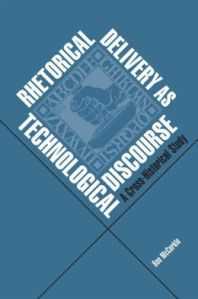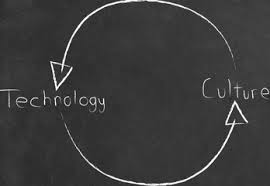As Ben McCorkle’s title suggests, Rhetorical Delivery as Technological Discourse: A Cross Historical Study is about the collision of technology, history, and rhetoric.
The locus of said collision is the equally maligned and praised canon of delivery. As McCorkle writes, “Delivery, also known as hypocrisis, actio, or elocution has suffered from a sort of disciplinary schizophrenia over the millennia. It has been variously regarded as the most important component of the entire rhetorical system, scrutinized as the most suspect and disdainful, and even outright ignored as the canon non grata of rhetoric” (2). McCorkle does not run from delivery’s fraught history; instead, he systematically historicizes the canon’s influence on both the expansion of rhetoric and emergence of new technologies. In his mind, delivery never disappeared at any historical moment, but rather functioned as an implicit influence on the developments of emerging ideologies and practices. McCorkle’s primary focus is delivery’s effect on the transition between the verbal and non-verbal rhetorical text, also known as the shift from oral culture to written culture.
Regardless of the text, the author grants that delivery has consistently been the “multi modal content” that helps convey a rhetorical message (McCorkle 1). Yet, McCorkle warns against viewing delivery as a neutral tool, but insists that the canon’s historical iterations and relationships with technological progressions have had a Burkean “transformative effect” on our society and culture (1). He, therefore, finds it imperative to focus on the interactions between/among delivery and emerging technics as a way to better understand what the canon has meant and continues to mean. In order to achieve this, McCorkle creates a historical narrative to name and measure the ways in which delivery “functions as a technological discourse” (5). He subsequently frames each historical milieu by Bolters and Grusin’s (2000) theory of remediation, expanding “their theory into the realm of discursive, institutional, and cultural interactions with media forms by specifically examining sites of rhetorical theory, practice, and pedagogy” (McCorkle 5).
While I delve deeper into what McCorkle’s redefinition of remediation looks like in the key concepts section, I provide the crust of his reason for using the theory here: technology and delivery (and in a larger sense, rhetoric) do not exist in a cultural vacuum. Rather, they are nebulous ideologies that both shape and are shaped by human agents and cultural movements:
So, while remediation has just only been recently named per se, the concept has been around for millennia. Furthermore, remediation has served as the catalyst for delivery, helping it along in a quest to “foster the cultural reception of emergent technologies of writing and technology by prescribing rules or by examining and privileging tendencies that cause old and new technologies to resemble one another” (McCorkle 5).
Works Cited
McCorkle, Ben. Rhetorical Delivery as Technological Discourse a Cross-historical Study. Carbondale: Southern Illinois UP, 2012. Print.



Pingback: New Text Report Peer Comments | Dawn of the Cyborg